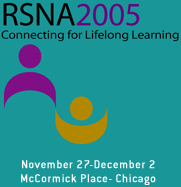
Abstract Archives of the RSNA, 2005
Daniel Ira Rosenthal MD, Abstract Co-Author: Nothing to Disclose
Dianne Whelton, Abstract Co-Author: Nothing to Disclose
Thomas Schultz, Abstract Co-Author: Nothing to Disclose
Daniel Todd Cohen MD, Presenter: Nothing to Disclose
Erik Nelson MD, Abstract Co-Author: Nothing to Disclose
Communication of test results is important and increasingly difficult. Results should be delivered in a manner appropriate to their significance, with important information distinguished from items of lesser importance.
For urgent findings ACR standards require direct communication (usually by telephone) with the requesting physician or his representative. There is no substitute for direct communication of this type. “Routine” findings, while important in their own way, are unlikely to present communication problems.
However, for important but not urgent findings, direct communication may be deemed unnecessary, impractical, or unwanted. However, reliance upon routine report delivery risks having the important finding lost among a host of less important data.
We have created an automated, electronic “Important Findings Alert” system that is triggered by the radiologist at the time of report dictation. Standard text in the report generates an e-mail to the referring clinician, alerting him/her to the potentially important finding. A link to the report is enclosed. Failure to open the link is tracked, and those referring clinicians are contacted.
In the first two months of use, 78 different radiologists sent 1218 alerts. The chest plain film was the most common examination to result in an alert. We will report our experience after one year of use, including common indications, frequency of use as a function of radiologist, examination type, and specialty of the requesting physician. We will also report the results of a survey of top users (radiologists) and top recipients. Common problems experienced and reaction by the clinicians will be described.
An automated alert for potentially important but not time-sensitive findings can be a useful addition to the communication between radiologist and clinician. The system has been well received by both groups of physicians.
Rosenthal, D,
Whelton, D,
Schultz, T,
Cohen, D,
Nelson, E,
Automated Important Findings Alert. Radiological Society of North America 2005 Scientific Assembly and Annual Meeting, November 27 - December 2, 2005 ,Chicago IL.
http://archive.rsna.org/2005/4405787.html

